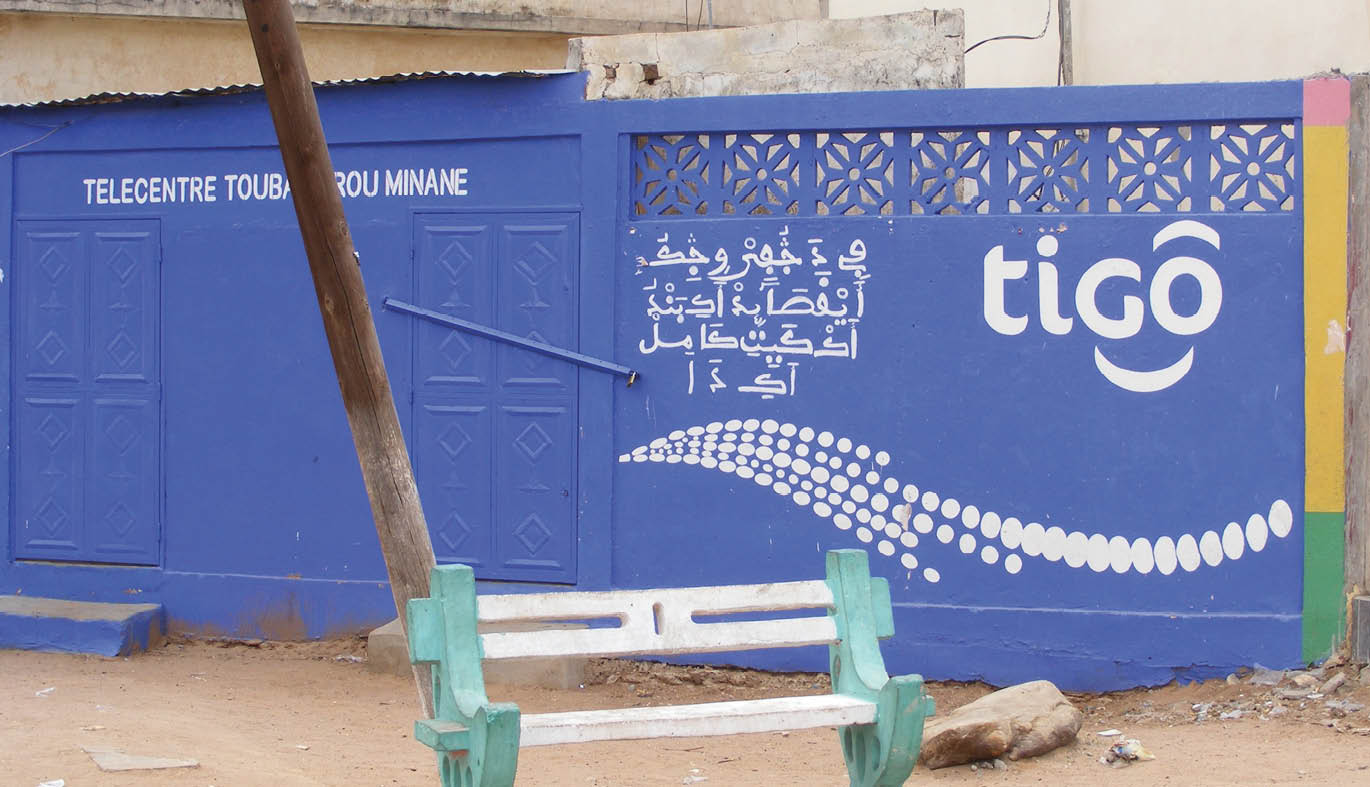Our Scholars at the African Studies Association Annual Meeting
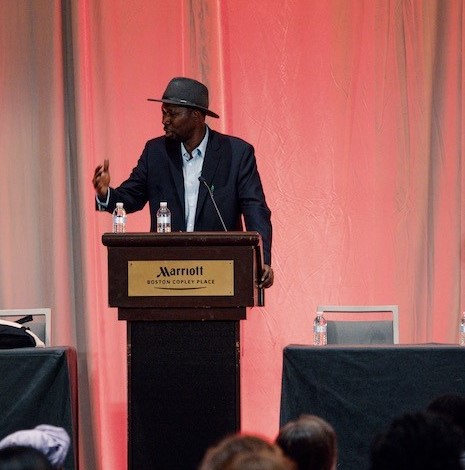 The African Studies Association 62nd Annual Meeting, “Being, Belonging and Becoming in Africa,” took place in Boston, MA, from November 21-23, 2019, in Boston Marriott Copley Place. The Annual Meeting featured presentations and contributions by several of our NEH Ajami Research Project scholars.
The African Studies Association 62nd Annual Meeting, “Being, Belonging and Becoming in Africa,” took place in Boston, MA, from November 21-23, 2019, in Boston Marriott Copley Place. The Annual Meeting featured presentations and contributions by several of our NEH Ajami Research Project scholars.
NEH Ajami project director Fallou Ngom was chosen to present this year’s African Studies Review Distinguished Lecture. The lecture series was established in 2011 featuring state of the art research in African Studies. Prof. Ngom’s lecture was titled “Beyond Orality: Non-Europhone Sources and African Studies in the 21st Century.” Dr. Ngom’s other engagements at the Annual Meeting included panels Between the Lines: African Languages in Ajami Manuscripts and Quranic Education, and Roundtable: Islamic Manuscripts, Muslim Intellectuals, and European Colonialisms in West Africa.
David Robinson was engaged in Roundtable: Joseph C. Miller Dialogues Part I: The Communal Ethos: Methods and Mentorship in African History, and served as discussant in panel Two Books on West African Islam - The Walking Qur’an: Islamic Education, Embodied Knowledge, and History in West Africa.
David Glovsky presented in panel The Importance of a Regional Approach: The Case of Senegambian History, and chaired and presented in Roundtable: Frontiers in Digital History in Africa: Trends, Opportunities, and Futures.
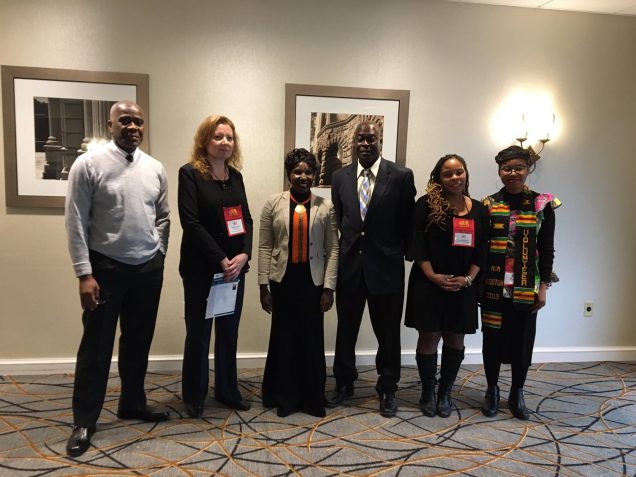
Daivi Rodima-Taylor served in the ASA Annual Meeting Local Arrangements Committee, and chaired and presented in the ASA Local Arrangements Committee Panel Building Bridges through Migration: First Generation African Immigrants. She also co-chaired and presented in panel Crypto-politics: Digital Media, Sociality, and Power.
Former ASA Board member, Jennifer Yanco, has been active in organizing local field tours and other ASA Local Arrangements Committee activities.
David Robinson on Ethnohistorical Fieldwork in West Africa
Our project member Dr. David Robinson describes his experience preparing and carrying out interviews in Senegal and Mali in the linked article “Interviewing, Intermediaries and Documents: Senegal and Mali,” published in Mande Studies (vol. 20, 2018). He emphasizes the importance of his assistants or intermediaries for the choice of informants and the conduct of the interviews, as well as the quality of translation of the sessions. In his fieldwork, he combined the interview material with documents, especially an Arabic ethnohistory written by Cheikh Moussa Kamara in the 1920s, to produce his publications on Futa Toro and al-hajj Umar. He also reflects on the transformation, i.e. Africanization, of the History Department at the University of Dakar. READ MORE HERE
Boston University Libraries Uploaded the World’s Largest Digital Collection by Mande Scholars
By Eleni Castro, Fallou Ngom, Daivi Rodima-Taylor
Boston University scholars and digital collections experts recently completed uploading the largest to date digital collection of Mande scholars' work in the world. The project EAP 1042, funded by the British Library/ARCADIA focused on the archives of Mandinka scholars of Casamance, Senegal. The BU team digitized over 18,000 pages of Arabic, Arabic-Ajami bilingual texts, and Mandinka Ajami manuscripts covering a variety of religious and non-religious subjects. These materials will help scholars and students of Africa for generations to come enhance their research and teaching on various aspects of pre-colonial, colonial, and post-colonial Africa.
The Ajami texts of the Mandinka people of Casamance in southern Senegal are not well known beyond local communities. Many of these sources are written in Mandinka Ajami, the enriched form of the Arabic script used to write the Mandinka language for centuries. Among the least documented, only a few Mande Ajami manuscripts (including languages such as Bamanankan, Eastern Maninka, Western Mandinka, Jakhanke, Jula, and Susu) are available to scholars. The recent EAP 1042 project funded by the British Library's Endangered Archives Programme has changed this, identifying and digitally preserving over 18,000 pages of Mandinka Ajami and Arabic texts from the Casamance region of Senegal. The Endangered Archives Programme provided digitization/curation guidance and funded this digital preservation project, which is supported by Arcadia, a charitable trust of Lisbet Rausing and Peter Baldwin and administered by the British Library.
The project involved an international research collaboration between Boston University, the West African Research Center, and local experts in Senegal. Several of the team members had extensive expertise in digital preservation of endangered manuscripts - for example, Professor Fallou Ngom led the initiative of digital preservation of Wolof Ajami manuscripts in Senegal in 2011, which resulted in the creation of the African Ajami Library at Boston University. Eleni Castro, OpenBU & ETD Program Librarian at Boston University Libraries, served as the Mandinka project’s technical lead and conducted training in best practices in digital preservation of manuscripts to the fieldwork team. Other participants in the project included scholars from Senegal, as well as local knowledge experts and distinguished elders.
One of the distinguishing characteristics of the project was its significant fieldwork component of working with manuscript owners and language experts in the local communities of Southern Senegal. Following a three-day digital preservation workshop at the West African Research Center (WARC) in Dakar in January 2018, the team spent 15 months interviewing manuscript owners and digitizing rare manuscripts from Ziguinchor, Kolda, and Sédhiou, and curating and post-processing over 18,000 digital images. Three independent copies were deposited at WARC in Dakar, the British Library, and Boston University’s African Ajami Library on OpenBU.
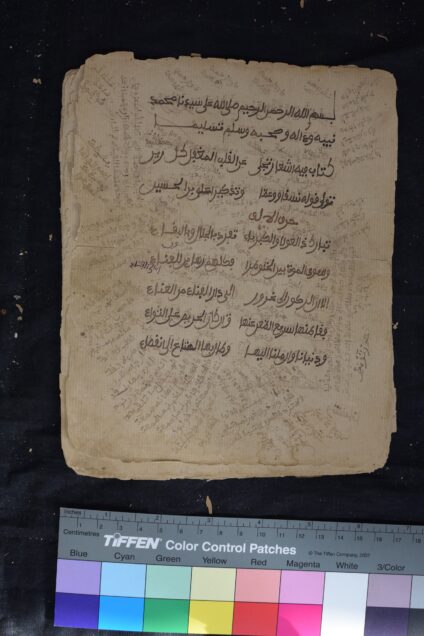
The manuscripts, often kept in trunks in the households of the local scholars or their descendants, covered a broad range of topics - including jurisprudence, divination and astrology, religious poetry and prose, secular records of commerce, local genealogies and biographies, folkloristic treatises of traditional medicine, customs and rites, accounts of social institutions and local cosmologies. Containing a wealth of knowledge about local livelihoods, customs and mores, several texts constituted more than static repositories – functioning as ‘living documents’ with their marginalia of opinions and insights that were continuously added as the texts journeyed among the community members. A significant part of the manuscripts consisted of poetry designed to be performed and recited in the local communities – serving as an efficient tool of education and socialization. The themes dealt with issues of politics, morality and ethics, family and community relations and norms, shared history and experience of war and peace.
Working in remote areas of rural Africa with limited access to power and adequate lighting also created certain technical challenges, prompting the team to find innovative ad-hoc solutions. In order to not burden the local households of manuscript owners, the team had to work with available light and the help of a macro ring flash. They found that replacing a hot camera battery with a cooler one after a period of work helped to resume digitization much faster. Locally available channels of communication, such as WhatsApp, were used to coordinate activities between the geographically dispersed team members. Fieldwork data were regularly uploaded on Google Drive, speeding up internet access with the help of a mobile hotspot modem.
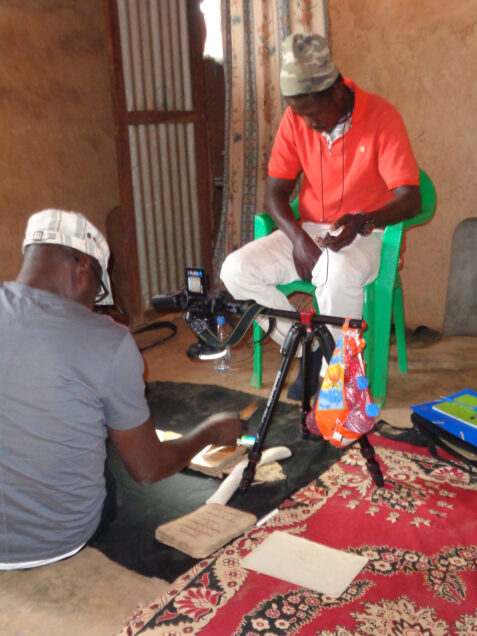
All of these materials are now publicly available in the African Ajami Library (AAL) on OpenBU and will soon be available on the British Library Endangered Archives Programme website. All of the digitization equipment and a copy of the digital archive will remain with the local partner, West African Research Center in Dakar, in order to support its digitization projects and make accessible the materials to researchers in the region. However, there is still more work to be done to help researchers more effectively discover, explore, and study these materials. The digital team will be looking into using an IIIF image viewer for scholars to more easily be able to view, compare, and annotate manuscripts. Since not all West African languages currently have their Ajami letters assigned Unicode characters, transcription is a long‐term goal to help make these materials more accessible. Another ongoing effort—from a social and cultural perspective—is sustaining and building enduring relationships with the manuscript owners and communities where the materials originated from.
The Social Life of African Ajami: Connecting the Grassroots, Mediating the Mundane
By Daivi Rodima-Taylor, Mustapha H. Kurfi, and Fallou Ngom
Grassroots Ajami literacy has been historically high in the communities of West Africa. While often viewed through the lens of its religious historical origins, it is increasingly evident that the use of Ajami scripts in a variety of African languages extends far beyond religious and educational contexts. African Ajami can be observed in a growing multiplicity of secular environments, including interpersonal communication, commercial advertising, street posters, billboards and road signs, political campaign ads, and the insignia of local businesses and services.
Ajami, which is the centuries-old practice of writing other languages using the modified Arabic script, is deeply embedded in local histories and socio-cultural practices, and we suggest that it should be analyzed within such context. Arising from Islamic clerical and educational campaigns of the 15th and 16th centuries, Ajami constituted an early source of literacy for a variety of local languages in Sub-Saharan Africa, including Yoruba, Mande, Wolof, Fula, and Afrikaans. Its history refutes the oft-prevailing claims that Africa lacks written traditions. The downplaying and devaluing of the significance of African Ajami has long characterized Arabic as well as European scholars and administrators of the colonial era, and its legacy still often persists, perpetuating racial stereotypes, limiting political participation, and obscuring ethnographic accounts of local practices and institutions. Systematic attention to African Ajami only started as an effort of African scholars of the post-colonial times.
Having flourished throughout centuries, Ajami has established itself as an important means of communication and a mediator of historical and contemporary knowledge in many areas of Africa where Qur’anic schools have been the primary source of education. Consider the example of Senegal. It is estimated that over 50% of the population of this ‘French-speaking country’ are illiterate in French, and adequate skills in written and oral French largely remain the purview of urban elites. Many ethnic groups of the country, including Wolof, Pulaar, and Mandinka, use Ajami scripts for their written communication. Ajami Wolofal (the language of the Wolof ethnic group) is used for both religious and secular purposes in the local communities, including personal written communication such as private letters, as well as in business records and advertisements of the informal sector.
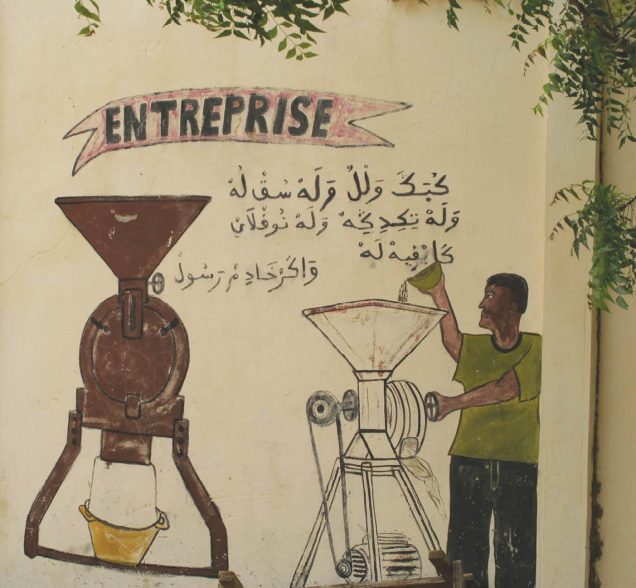
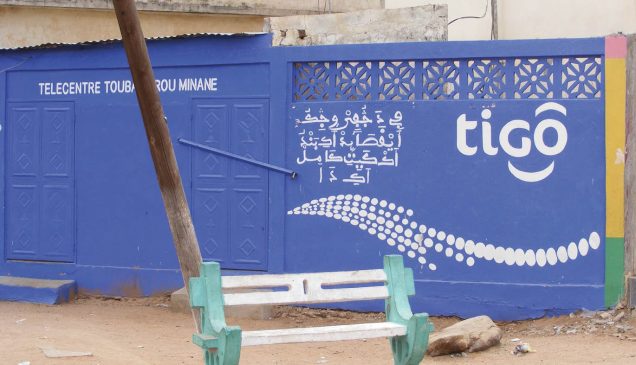

Below are examples of political campaign posters in Ajami Nupe, collected by Mustapha Kurfi. Nigerian general elections took place in February 2019, with incumbent president Muhammadu Bahari (All Progressives Congress) winning his re-election bid with 55.6%, against the 44.2% of the opponent Atiku Abubakar (People’s Democratic Party). The political posters feature Ajami Nupe use in national and regional political campaign materials.
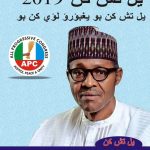
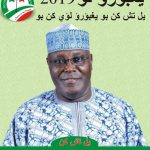
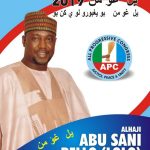
While Ajami is thus increasingly used as a mass communication tool in the commercial and political life of numerous West African ethnic groups, there is still room for the formal recognition of its central role in mediating the grassroots by African national governments, supra-governmental bodies, and international development actors. And although there exists an increasing scholarly awareness about the importance of studying diverse historical records of African Ajami, few are those who know about Ajami as a fascinating lens into everyday livelihood practices, political struggles, and social imaginaries of many contemporary African communities.
PLEASE READ A VERSION OF THIS ARTICLE IN AFRICA@LSE BLOG OF THE LONDON SCHOOL OF ECONOMICS
New Research Project on ʿAjamī Literature, Literacy and Culture in West Africa
By Daivi Rodima-Taylor
The Boston University African Studies Center has started work on an important scholarly project that provides a new window into the history, cultures, and intellectual traditions of West Africa. The project ʿAjamī Literature and the Expansion of Literacy and Islam: The Case of West Africa that was awarded a NEH Collaborative Research Grant, will digitize a unique selection of manuscripts in ʿAjamī (African language texts written with a modified Arabic script) in four major West African languages - Hausa, Mandinka, Fula, and Wolof, transliterate and translate them into English and French, prepare commentaries, and create related multimedia resources to be made widely available within and beyond the United States.
The ʿAjamī literatures that have developed in sub-Saharan Africa and hold a wealth of knowledge on the history, politics, and cultures of the region, are generally unknown to scholars and the public due to lack of access. This Collaborative Research project between the scholars from institutions in the U.S. and West Africa seeks, through increasing access to primary sources in ʿAjamī, to spark research and scholarly work on this important heritage of Muslim Africa. It brings together a multi-disciplinary team of experts working on different languages and contexts to achieve two interlinked goals: 1) to show the importance of African ʿAjamī traditions by building collections and analyzing representative manuscripts, and 2) to conduct interpretive humanities research that will open up a sustained examination of the ʿAjamī phenomenon in sub-Saharan Africa. Representing the first comparative approach to African languages written in ʿAjamī, this pioneering project seeks to integrate ethnographic fieldwork, interviews, and multi-media formats to illuminate the histories and the educational, cultural, political and religious significance of ʿAjamī in West Africa.
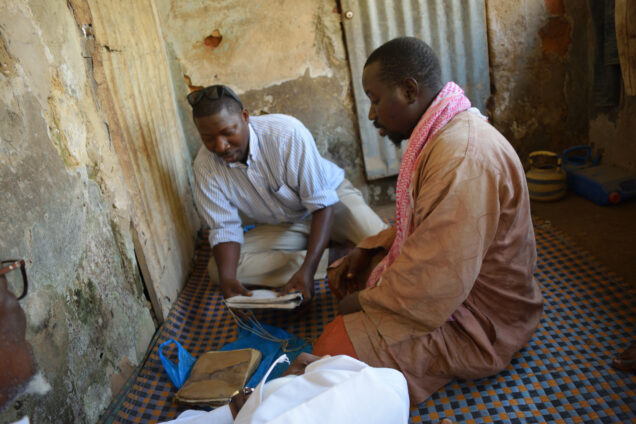
The interdisciplinary and international project team consists of Fallou Ngom (Principal Investigator), Daivi Rodima-Taylor (Project Manager), digital humanities specialists of the Geddes Language Lab from Boston University – Mark Lewis (Director of the Geddes Lab), Shawn Provencal (Director of Programming), Alison Parker (Web Designer) and Frank Antonelli (Video Resources Specialist), and Rebecca Shereikis (Publication Consultant) at ISITA Northwestern University. Language team consultants include Jennifer Yanco, Mustafa Hashim Kurfi, and Garba Zakari for the Hausa digital team; Fallou Ngom, Bala Saho, and Ablaye Diakite for Mandinka team; David Robinson, David Glovsky, and Mouhamadou Lamine Diallo for Fula team; and Fallou Ngom, Ablaye Diakite, and Mouhamadou Lamine Diallo for Wolof team. Our work will be done in collaboration with ISITA at Northwestern University, IFAN (Institut Fondamental d’Afrique Noire), Michigan State University, WARA (West African Research Association), WARC (West African Research Center in Dakar, Senegal) and colleagues from Bayero University and Kaduna Polytechnic in Nigeria. The BU African Studies Center will contribute logistical support.

On June 18th, the project’s core team convened for a planning meeting at the BU African Studies Center, joined via skype by participants from other institutions in the United States and Africa. Attendees included Fallou Ngom, Daivi Rodima-Taylor, Jennifer Yanco, Mark Lewis, Shawn Provencal, Alison Parker Frank Antonelli, Rebecca Shereikis (Northwestern University), Mustafa Kurfi (Hausa digital team), David Glovsky (Michigan State University), and Eric Schmidt and Natasha Patel of BU ASC.
The NEH Collaborative Research Project builds on the pioneering work on ʿAjamī literatures and cultures at the Pardee School of Global Studies of Boston University. A prior project on Wolofal was funded by the British Library's Endangered Archive Programme. In 2011-12, working with his Senegal based team, prof. Ngom collected and digitized 5,400 pages from 29 manuscripts and 15 collections, deposited at the West African Research Center, the British Library, and Boston University. The current project will also build upon several other earlier projects hosted by Boston University, Northwestern University, and Michigan State University and MATRIX, focusing on ʿAjamī and Islam in West Africa.
